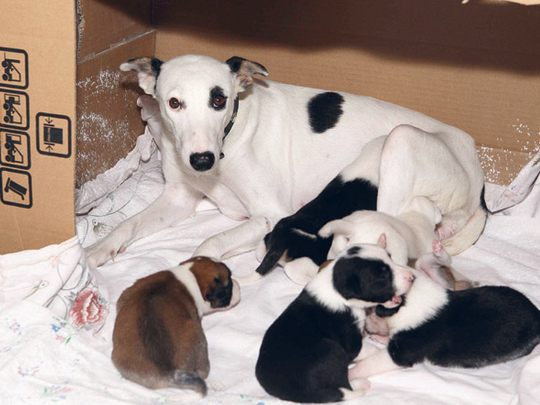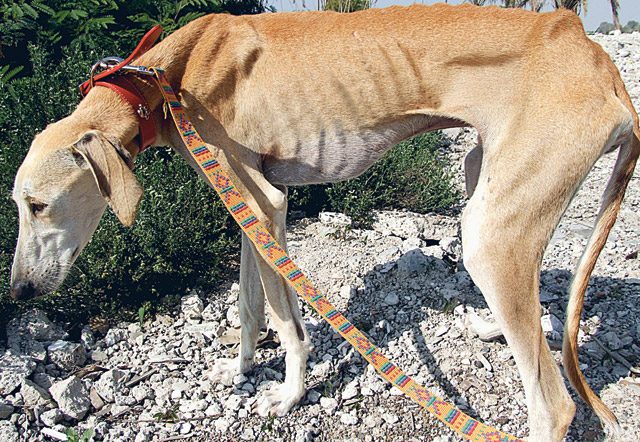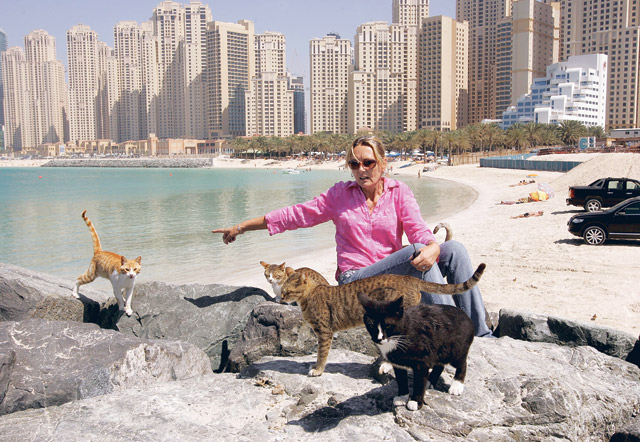
The hungry, the unwanted, the abused — they are the abandoned pets in the UAE. The tales of horror abound; animals left tied to airport gates, dumped near garbage bins with names on sticky tape functioning as makeshift collars, thrown out of moving cars, forgotten in homes long after the dust has settled in the wake of movers.
Desperate, they take to the streets, get fed by kind strangers or knocked down dead by speeding vehicles. Sometimes they get rescued, re-homed and find love.
Based on a rough estimate of animals taken in by some clinics and rescue homes across the country — an average of 80 to 100 animals are abandoned every month. Gulf News attempts to understand why.
People don't care
For Cedric Coucke, a Belgian dental surgeon who also functions as an equine dentist and natural hoof care practitioner based in Dubai, the biggest problem is "the transitional nature of the place".
He said expatriates come in, get a pet and don't really invest in the lifestyle education necessary when getting a pet. "People go on holidays, pet shelters are quite expensive ... sometimes more expensive than the pet. It's easier to abandon the animal."
Montserrat Martin, artist and founder of Friends of Animals Dubai (www.friendsofanimalsdxb.com) echoes the sentiment. She reasons that expatriates come in for a while, "get a villa, a 4-WD and a nice dog".
Once the contract ends and they have to go back, the situation might not allow them to keep a pet. She said: "It's not easy in Europe, you would need a villa. So, they pack up their belongings, their children and leave the animals behind without any remorse.
"Sometimes they drive into the desert, leave the dog under a tree and drive off. We have come across tyre and feet marks that show this when rescuing an animal. Usually the animals slowly starve to death."
The appalling truth of this behaviour compels us to ask, again — why?
Cost seems to be the overwhelming response. Coucke explains: "The average cost of placing a dog in a shelter when travelling for a month is anything between Dh1,200 to 1,500. We rescued a black Labrador. To just do blood, stool and urine tests, it cost us Dh6,000."
A recent hip surgery for a Turkish Angora cat cost a reader Dh8,000. She had rescued the animal from being savaged on the street.
Not many people would be willing to pay such large sums for veterinary costs.
Expensive health care
Lesley Muncey the chairperson of Feline Friends (www.felinefriendsdubai.com), an extremely active cat rescue organisation, feels that private pet health care in the UAE is "extortionate". As per their website, in 2008, 607 cats were homed and 933 sterilised with their veterinary bills for the year reaching Dh321,210. This is despite being supported and subsidised by clinics.
"A cat gets sick, you need money ... people tend to leave it," Muncey said. "Animal health care is expensive, the medication from pharmacies is expensive."
Having said that, she asked: "[Despite the cost], would you leave your children in such a case?"
Dr Max Spicer, head of the Veterinary Hospital in Dubai, argues to the contrary.
He said: "I am from the UK ... the cost [here] is comparable. I can see that chronic skin diseases for large-bred animals could cost thousands of dirhams but it would be the same in any country offering Western medicine." He added that in some cases medicines for illnesses such as arthritis and cancer are priced high.
Dr Jonathan Hale, head of the British Veterinary Centre in Abu Dhabi said that the high cost of pet health care in the UAE is more about "perception rather than rational comparison".
He said: "The fact is that veterinary care and treatment in the UAE is 25 per cent cheaper than the UK because we are not paying tax here. [Clinics] are run at 10 to 20 per cent profitability ... it is an ethical margin."
Dr Hale explained that the cost can be kept down if clinics could be helped to lower extraneous costs. "We get a number of abandoned animals, almost every day ... dogs, cats, hamsters and ferrets. Three cats were left in a suitcase outside the clinic [recently]. We have a reputation for looking after animals but it saps our resources. Staff have to be allocated and medical care provided. Then we have to look at re-homing. It has an impact on the revenue."
For Melissa Davis, who runs the RAK Animal Welfare Centre in Ras Al Khaimah, it is also about being prudent with your finances and planning. She said: "We plan ahead with medical insurance ... [the same holds] for pets. Veterinary care is more affordable here than in Canada. There is also no harm in asking around with different clinics about cost."
Excessive breeding
The matter of abandonment because of cost is definitely not helped when pets increase in number with uncontrolled breeding and indiscriminate gifting of puppies and kittens on festive occasions.
Muncey of Feline Friends said: "Pets are not for gifts. We see a lot of it here. The only solution is education, starting with children. We go into schools, talk to them and they will hopefully educate their parents and break this chain."
This happens because greedy animal sellers make a lucrative living. Martin of Friends of Animals Dubai recounted an episode that conveyed the extent of the problem that unsupervised breeding is creating.
"We walked into a person's farm. I was accompanying people who wanted to adopt some puppies. There were about 40 pups lying around on the floor in various stages of malnutrition!" There were too many dogs, not enough buyers, so no food.
An answer would be to have tougher control and allow breeding by only those registered and linked to international kennel clubs, advised Tina Al Qubaisi, who runs the Dhabia Rahma Animal Rescue Centre in Abu Dhabi (dhabiarahmaanimalrescue@live.com).
She said: "People have to realise that babies of animals might be cute but they grow up. Also, breeders sell these animals for huge sums."
Davis of the RAK Animal Welfare Centre said that there also needs to be a strong push for sterilisation of animals sold as pets.
"People end up dumping the mixed puppies. When people buy animals, [it should be mandatory that] pets are sterilised."
Yet another issue is lack of awareness when it comes to international transport cost and laws on pet relocation.
Muncey of Feline Friends said; "New Zealand and Australia are the toughest to take an animal back to. The quarantine laws are strict, which can be inhibitive."
Dr Hale of the British Veterinary Centre in Abu Dhabi said: "It is not cheap to travel with your animal. The entire package including paperwork and blood tests costs about Dh13,000 for the UK, Dh17,000 for Australia and Dh15,000 for the US. It's a significant amount of money, which affects the decision making [of families].
"We have to recognise that we are all humans and some people don't recognise a pet as a family member. There is a lack of motivation when it comes to a pet."
Euthanasia
Although Dr Hale strongly advises against it as he is "pro-life", almost all the people who work with rescued animals say that the situation is so bad that if a person believes that he or she has expired all options to take an animal back with them or re-home it, it might be kinder to "euthanise the pet".
Martin of Friends of Animals Dubai said: "Recently, a German Shepherd and Rottweiler cross lay ignored after being hit by a car. She lay paralysed for days. Maggots got into the wounds that were rotting and bored holes in the hind legs. The dog had to be put down. The animal suffered for days — for what?"
Davis of the RAK Animal Welfare Centre is of a similar opinion. She added: "You abandon an animal, it will most probably get poisoned, get into fights and be injured, suffer malnutrition or get hit by a car.
"It is kinder to put the animal to sleep."














